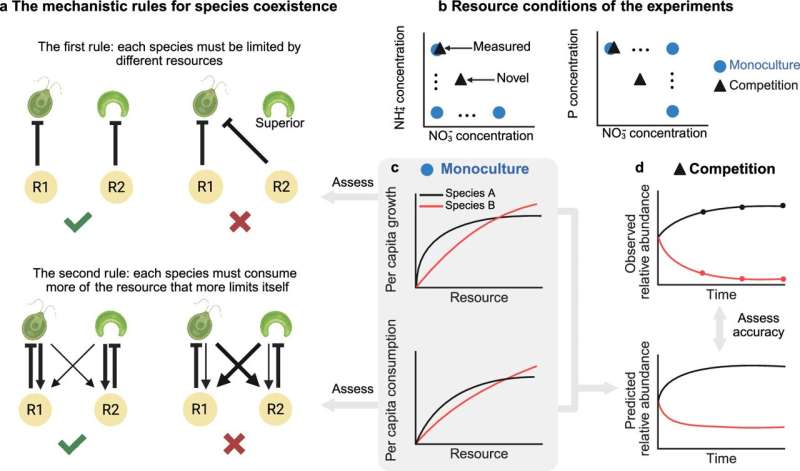Science
Researchers Develop Model to Predict Ecosystem Changes

Researchers at the University of Konstanz have developed a mechanistic model that can accurately predict the development of biological communities across various ecosystems. Published in Nature Communications on November 13, 2025, the study focuses on the dynamic nature of biological communities, which are often in flux due to changing environmental conditions. This model has the potential to enhance our understanding of species coexistence and resource competition.
Biological communities are not static; they continually evolve based on environmental factors, sometimes leading to the extinction of individual species. To forecast these changes, scientists rely on ecological models, with mechanistic models being the most promising. These models are grounded in biological mechanisms that govern how species coexist, allowing for more reliable predictions of community composition.
Testing the Mechanistic Model
The research team aimed to validate their mechanistic consumer-resource model using communities of freshwater algae. Lutz Becks, a professor of limnology at the University of Konstanz, led the study and highlighted the importance of rigorous testing. “Previous attempts had some success, but comprehensive testing required extensive experimentation, which modern lab equipment has finally made feasible,” Becks noted.
The initial phase of the research involved determining the nutrient needs and consumption patterns of various freshwater algae species, requiring a total of 864 growth experiments. Advanced laboratory technology, including automated systems for preparing monocultures and high-throughput microscopes for counting algae, streamlined this process. Additionally, artificial intelligence played a crucial role in identifying different algae species during subsequent experiments.
After establishing the foundational data, the researchers expanded their model to incorporate resource usage as a vital parameter. This led to a further 960 experiments, where different combinations of algae were tested under various nutrient conditions. The results confirmed the model’s predictive capability, aligning closely with the observed community developments.
Insights on Resource Competition
The researchers also utilized computer simulations to evaluate two ecological rules proposed by biologist David Tilman. These rules suggest that competing species can either coexist or displace one another based on resource limitations. The simulations revealed that the first rule holds universally, while the second rule is applicable only when species compete for replaceable resources, rather than essential nutrients.
“Understanding these distinctions is critical for predicting community interactions,” explained Zhijie Zhang, the first author of the study. The findings could have broader implications for managing biological communities, whether in natural environments or biotechnological applications.
The research team’s next step involves applying their model to a project focused on CO2 sequestration through phytoplankton. Supported by the Vector Stiftung, this initiative aims to identify resilient phytoplankton communities capable of effectively metabolizing CO2, even amid varying environmental factors such as nutrient availability and temperature.
This innovative research not only advances ecological modeling but also holds promise for addressing critical environmental challenges, including climate change and resource management. As Becks stated, “Our goal is to create communities that can reliably sequester CO2 from the atmosphere, contributing to climate protection efforts.”
The comprehensive nature of this study underscores the potential of mechanistic models in understanding and predicting ecological dynamics, offering valuable insights for both scientists and policymakers.
-

 Lifestyle4 months ago
Lifestyle4 months agoLibraries Challenge Rising E-Book Costs Amid Growing Demand
-

 Sports4 months ago
Sports4 months agoTyreek Hill Responds to Tua Tagovailoa’s Comments on Team Dynamics
-

 Sports4 months ago
Sports4 months agoLiverpool Secures Agreement to Sign Young Striker Will Wright
-

 Lifestyle4 months ago
Lifestyle4 months agoSave Your Split Tomatoes: Expert Tips for Gardeners
-

 Lifestyle4 months ago
Lifestyle4 months agoPrincess Beatrice’s Daughter Athena Joins Siblings at London Parade
-

 World3 months ago
World3 months agoWinter Storms Lash New South Wales with Snow, Flood Risks
-

 Science4 months ago
Science4 months agoTrump Administration Moves to Repeal Key Climate Regulation
-

 Science3 months ago
Science3 months agoSan Francisco Hosts Unique Contest to Identify “Performative Males”
-

 Business4 months ago
Business4 months agoSoFi Technologies Shares Slip 2% Following Insider Stock Sale
-

 Science4 months ago
Science4 months agoNew Tool Reveals Link Between Horse Coat Condition and Parasites
-

 Sports4 months ago
Sports4 months agoElon Musk Sculpture Travels From Utah to Yosemite National Park
-

 Science4 months ago
Science4 months agoNew Study Confirms Humans Transported Stonehenge Bluestones









